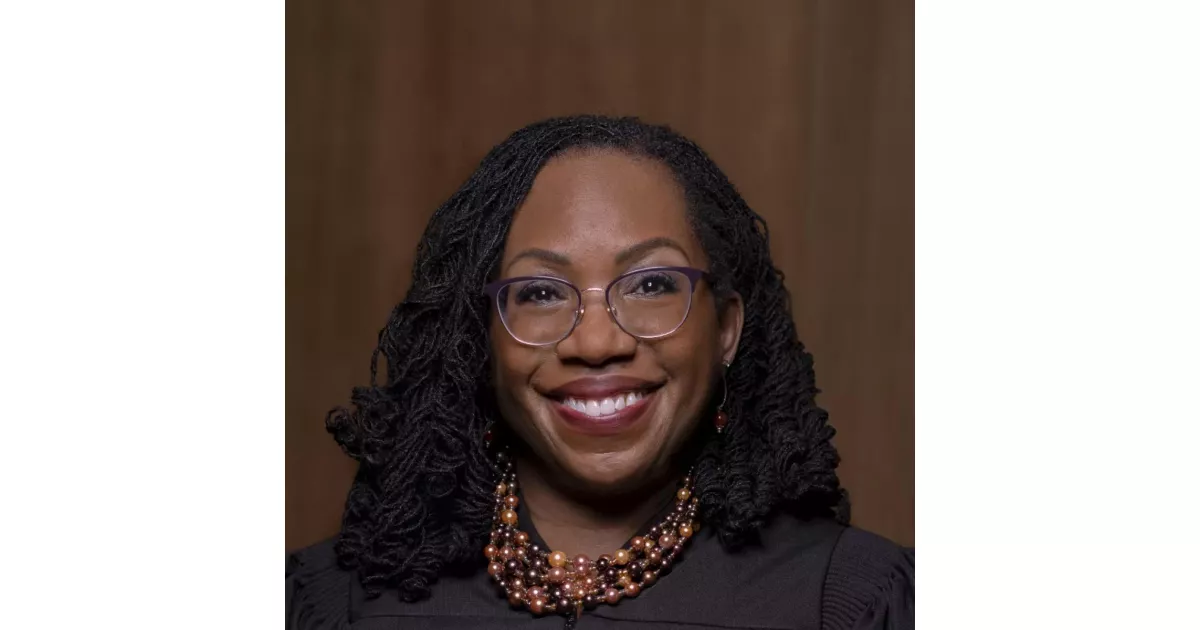Ketanji Onyika Brown Jackson is an American lawyer and jurist currently serving as an associate justice of the Supreme Court of the United States. Nominated by President Joe Biden, she was confirmed and sworn in 2022. Jackson is notable for being the first black woman, the first former federal public defender, and the sixth woman to hold a position on the United States Supreme Court.
September 14, 1970: Ketanji Onyika Brown Jackson Born
On September 14, 1970, Ketanji Onyika Brown Jackson was born. She is an American lawyer and jurist, currently serving as an associate justice of the Supreme Court of the United States.
1988: Graduation and Class Presidency
In 1988, Ketanji Brown Jackson graduated from Palmetto High School as senior class president.
1992: Staff Reporter and Researcher for Time Magazine
From 1992 to 1993, Ketanji Brown Jackson worked as a staff reporter and researcher for Time magazine.
1992: Graduation from Harvard University
In 1992, Ketanji Brown Jackson graduated from Harvard University with a Bachelor of Arts, magna cum laude.
1993: Attended Harvard Law School
In 1993, Ketanji Brown Jackson attended Harvard Law School, where she was a supervising editor of the Harvard Law Review.
1996: Law Clerk to Judge Patti B. Saris
From 1996 to 1997, Ketanji Brown Jackson served as a law clerk to Judge Patti B. Saris of the U.S. District Court for the District of Massachusetts.
1996: Graduation from Harvard Law School
In 1996, Ketanji Brown Jackson graduated from Harvard Law School with a Juris Doctor, cum laude.
1996: Marriage to Patrick Graves Jackson
In 1996, Ketanji Brown Jackson married surgeon Patrick Graves Jackson, whom she met at Harvard College.
1997: Law Clerk to Judge Bruce M. Selya
From 1997 to 1998, Ketanji Brown Jackson worked as a law clerk to Judge Bruce M. Selya of the U.S. Court of Appeals for the First Circuit.
1998: Private Practice at Miller Cassidy Larroca & Lewin
In 1998, Ketanji Brown Jackson spent a year in private practice at the Washington, D.C., law firm of Miller Cassidy Larroca & Lewin (now part of Baker Botts).
1999: Clerk for Supreme Court Justice Stephen Breyer
From 1999 to 2000, Ketanji Brown Jackson clerked for Supreme Court Justice Stephen Breyer.
2000: Returned to Private Legal Practice
From 2000 to 2002, Ketanji Brown Jackson returned to private legal practice at the law firm of Goodwin Procter.
2000: End of Clerkship for Justice Stephen Breyer
In 2000, Ketanji Brown Jackson's clerkship for Supreme Court Justice Stephen Breyer concluded.
2002: Law Firm of Feinberg & Rozen LLP
From 2002 to 2003, Ketanji Brown Jackson worked under Kenneth Feinberg at the law firm now called Feinberg & Rozen LLP.
2003: Assistant Special Counsel
From 2003 to 2005, Ketanji Brown Jackson served as an assistant special counsel to the United States Sentencing Commission.
2003: Michael E. Horowitz served on the Sentencing Commission
From 2003 until 2009, Michael E. Horowitz served as the vice chair of the United States Sentencing Commission.
2005: Assistant Federal Public Defender
From 2005 to 2007, Ketanji Brown Jackson was an assistant federal public defender in Washington, D.C., handling cases before the United States Court of Appeals for the District of Columbia Circuit.
2007: Appellate Specialist in Private Practice
From 2007 to 2010, Ketanji Brown Jackson worked as an appellate specialist in private practice at the law firm of Morrison & Foerster.
July 23, 2009: Nomination as Vice Chair of the United States Sentencing Commission
On July 23, 2009, President Obama nominated Ketanji Brown Jackson as vice chair of the United States Sentencing Commission.
November 5, 2009: Senate Judiciary Committee Favorably Reported Nomination
On November 5, 2009, the Senate Judiciary Committee favorably reported Ketanji Brown Jackson's nomination by voice vote.
February 11, 2010: Senate Confirmation as Vice Chair
On February 11, 2010, the Senate confirmed Ketanji Brown Jackson's nomination as vice chair of the United States Sentencing Commission by voice vote.
2010: Vice Chairwoman of the United States Sentencing Commission
In 2010, Ketanji Brown Jackson became the vice chairwoman of the United States Sentencing Commission, a role she held until 2014.
2010: End of term as Appellate Specialist in Private Practice
In 2010, Ketanji Brown Jackson's term as an appellate specialist in private practice at the law firm of Morrison & Foerster came to an end.
September 20, 2012: Nomination as United States District Judge
On September 20, 2012, President Obama nominated Ketanji Brown Jackson to serve as a United States district judge for the District of Columbia.
December 2012: Confirmation Hearing Introduction
In December 2012, U.S. Representative Paul Ryan introduced Ketanji Brown Jackson at her confirmation hearing, offering unequivocal praise for her intellect, character, and integrity.
2012: Pierce v. District of Columbia Ruling
In 2012, the D.C. Department of Corrections violated the rights of a deaf inmate under the Americans with Disabilities Act because jail officials failed to provide the inmate with reasonable accommodations, or to assess his need for reasonable accommodations, during his detention. The rulling was given in 2015.
February 14, 2013: Senate Judiciary Committee Report
On February 14, 2013, the Senate Judiciary Committee favorably reported Ketanji Brown Jackson's nomination by voice vote.
2013: Appointment as District Judge
In 2013, Ketanji Brown Jackson was appointed by President Barack Obama to serve as a district judge for the United States District Court for the District of Columbia.
2013: American Meat Institute v. U.S. Department of Agriculture Ruling
In 2013, in the case of American Meat Institute v. U.S. Department of Agriculture, Jackson rejected the meat packing industry's request for a preliminary injunction against a United States Department of Agriculture rule requiring them to identify animals' country of origin. Jackson found that the rule likely did not violate the First Amendment.
2014: End of term as Vice Chairwoman of the United States Sentencing Commission
In 2014, Ketanji Brown Jackson concluded her service as the Vice Chairwoman of the United States Sentencing Commission, a position she had held since 2010.
2014: End of Service on Sentencing Commission
In 2014, Ketanji Brown Jackson concluded her service on the United States Sentencing Commission.
2014: Depomed v. Department of Health and Human Services Ruling
In 2014, in Depomed v. Department of Health and Human Services, Jackson ruled that the Food and Drug Administration (FDA) had violated the Administrative Procedure Act when it failed to grant pharmaceutical company Depomed market exclusivity for its orphan drug Gralise. She concluded that the Orphan Drug Act required the FDA to grant Gralise exclusivity.
2015: Pierce v. District of Columbia Ruling
In 2015, Jackson ruled in Pierce v. District of Columbia that the D.C. Department of Corrections violated the rights of a deaf inmate under the Americans with Disabilities Act because jail officials failed to provide the inmate with reasonable accommodations, or to assess his need for reasonable accommodations, during his detention in 2012.
2016: Harvard Board of Overseers Member
From 2016, Jackson served as a Harvard Board of Overseers member until 2022.
2017: Family History Revelation
In a 2017 speech, Ketanji Brown Jackson said, "I am fairly certain that if you traced my family lineage back past my grandparents—who were raised in Georgia, by the way—you would find that my ancestors were slaves on both sides."
June 2018: Teen Pregnancy Prevention Programs Ruling
In April and June 2018, Jackson presided over two cases challenging the Department of Health and Human Services' decision to terminate grants for teen pregnancy prevention programs two years early. In June 2018, she ruled that the decision to terminate the grants early without explanation was arbitrary and capricious.
2018: Dismissal of Malaysia Airlines Flight 370 Lawsuits
In 2018, Jackson dismissed 40 wrongful death and product liability lawsuits stemming from the disappearance of Malaysia Airlines Flight 370, which had been combined into a single multidistrict litigation. She held that the suits should be brought in Malaysia, not the U.S.
2018: American Federation of Government Employees, AFL-CIO v. Trump Ruling
In 2018, Jackson invalidated provisions of three executive orders in American Federation of Government Employees, AFL-CIO v. Trump that would have limited the time federal employee labor union officials could spend with union members, the issues that unions could bargain over in negotiations, and the rights of disciplined workers to appeal disciplinary actions. She ruled that the executive orders violated the right of federal employees to collectively bargain, as guaranteed by the Federal Service Labor-Management Relations Statute.
2019: Make The Road New York v. McAleenan Ruling
In 2019, Jackson issued a preliminary injunction in Make The Road New York v. McAleenan, blocking a Trump administration rule that would have expanded expedited removal without immigration court hearings for undocumented immigrants. She found that the Department of Homeland Security had violated the Administrative Procedure Act.
2019: Committee on the Judiciary of the U.S. House of Representatives v. McGahn Ruling
In 2019, Jackson issued a ruling in Committee on the Judiciary of the U.S. House of Representatives v. McGahn, compelling former White House Counsel Don McGahn to comply with a subpoena to appear at an impeachment inquiry hearing. Jackson rejected the administration's assertion of executive testimonial immunity.
2019: Ruling on Trump Executive Orders
In 2019, Jackson ruled that provisions in three Trump executive orders conflicted with federal employee rights to collective bargaining. Her decision was reversed unanimously by the D.C. Circuit.
2019: Center for Biological Diversity v. McAleenan Ruling
In 2019, in Center for Biological Diversity v. McAleenan, Jackson held that Congress had stripped federal courts of jurisdiction to hear non-constitutional challenges to the Homeland Security Secretary's decision to waive certain environmental requirements to facilitate construction of a border wall.
2019: Vacation of Ruling on Jurisdictional Grounds
In 2019, the D.C. Circuit vacated Jackson's 2018 ruling in American Federation of Government Employees, AFL-CIO v. Trump on jurisdictional grounds.
August 2020: D.C. Circuit Affirms Part of Decision
In August 2020, the D.C. Circuit affirmed part of Jackson's 2019 decision in Committee on the Judiciary of the U.S. House of Representatives v. McGahn.
2020: Affirmation of Ruling in Malaysia Airlines Case
In 2020, the D.C. Circuit affirmed Jackson's 2018 ruling regarding the dismissal of lawsuits related to Malaysia Airlines Flight 370.
2020: Reversal of Preliminary Injunction
In 2020, the D.C. Circuit reversed the entry of the preliminary injunction that Jackson issued in 2019 in Make The Road New York v. McAleenan.
March 30, 2021: Biden Announces Intention to Nominate Jackson
On March 30, 2021, President Biden announced his intention to nominate Ketanji Brown Jackson as a United States circuit judge for the District of Columbia Circuit.
April 19, 2021: Nomination Sent to Senate
On April 19, 2021, Ketanji Brown Jackson's nomination as a United States circuit judge for the District of Columbia Circuit was sent to the Senate. The nomination was for the seat vacated by Judge Merrick Garland.
April 28, 2021: Hearing Before Senate Judiciary Committee
On April 28, 2021, a hearing on Ketanji Brown Jackson's nomination was held before the Senate Judiciary Committee. During the hearing, she was questioned about several of her rulings against the Trump administration.
June 4, 2021: McGahn Testifies Behind Closed Doors
On June 4, 2021, Don McGahn testified behind closed doors under an agreement reached with the Biden administration, while the case stemming from Jackson's 2019 ruling remained pending.
June 17, 2021: End of service as a district judge
On June 17, 2021, Ketanji Brown Jackson's service as a district judge ended when she was elevated to the court of appeals.
2021: Elevation to the United States Court of Appeals
In 2021, Joe Biden elevated Ketanji Brown Jackson to the United States Court of Appeals for the District of Columbia Circuit, where she served until 2022.
2021: Conservative activists pointed to certain decisions by Jackson
In spring 2021, Bloomberg Law reported that conservative activists pointed to certain decisions by Jackson that had been reversed on appeal as a potential blemish on her record.
February 25, 2022: Nomination to the Supreme Court
On February 25, 2022, Ketanji Brown Jackson was nominated to the Supreme Court by President Joe Biden. She was later confirmed by the U.S. Senate and sworn into office the same year, becoming the first black woman, the first former federal public defender, and the sixth woman to serve on the United States Supreme Court.
June 29, 2022: End of Circuit Judge Service
On June 29, 2022, Ketanji Brown Jackson's service as a circuit judge ended, the day before she was sworn in as an Associate Justice of the United States Supreme Court.
June 30, 2022: Sworn in as Associate Justice
On June 30, 2022, Ketanji Brown Jackson was sworn in as an associate justice of the Supreme Court at noon, when Justice Breyer's retirement became effective.
September 28, 2022: Assigned as Circuit Justice for the First Circuit
On September 28, 2022, Ketanji Brown Jackson was assigned as the circuit justice for the First Circuit.
2022: End of term at the United States Court of Appeals
In 2022, Ketanji Brown Jackson left the United States Court of Appeals for the District of Columbia Circuit.
February 28, 2023: Authored First Majority Opinion
On February 28, 2023, Justice Ketanji Brown Jackson authored her first majority opinion for a unanimous court in Delaware v. Pennsylvania, concerning how unclaimed money from MoneyGrams are distributed among individual states.
June 1, 2023: Dissenting Opinion in Glacier Northwest, Inc. v. Teamsters
On June 1, 2023, Justice Jackson wrote the sole dissenting opinion in Glacier Northwest, Inc. v. Teamsters, concerning the power of employers to sue labor unions regarding the destruction of employer property following a strike.
June 13, 2024: Opinion in Starbucks Corporation v. McKinney
On June 13, 2024, Jackson wrote an opinion, concurring in part and dissenting in part, in Starbucks Corporation v. McKinney, regarding court deference to NLRB authority in labor disputes.
December 2024: Broadway Debut in & Juliet
In December 2024, Ketanji Brown Jackson appeared in the Broadway production of & Juliet in a brief cameo playing herself.
July 8, 2025: Dissent in AFGE v. Trump
On July 8, 2025, in AFGE v. Trump, the Supreme Court issued an emergency order on Trump's federal workforce reorganization, ruling in Trump's favor 8–1, with Jackson as the lone dissenter.
2026: Grammy Nomination for Best Audio Book, Narration, and Storytelling
In 2026, Ketanji Brown Jackson was nominated for Best Audio Book, Narration, and Storytelling at the Grammy Awards for her recording of Lovely One.
Mentioned in this timeline

Starbucks is an American multinational coffeehouse chain established in Seattle...

Barack Obama the th U S President - was the...

Joe Biden is an American politician who served as the...

The White House located at Pennsylvania Avenue NW in Washington...

Washington D C is the capital city and federal district...
Pennsylvania is a U S state located in the Mid-Atlantic...
Trending

56 minutes ago Selena Gomez's Spiced-Plum Manicure and TikTok Clone Theory Spark Buzz

56 minutes ago Kit Harington and Sophie Turner Gag After On-Screen Kiss in New Movie

56 minutes ago Trump administration updates, Iran nuclear efforts, and White House controversies unfold.

56 minutes ago Dario Amodei Highlights India's Central Role in Shaping AI's Future at AI Summit.

2 hours ago Yoon Suk Yeol, South Korean ex-president, receives life sentence for insurrection and martial law.

4 hours ago Maya Hawke and Christian Lee Hutson celebrated wedding with Stranger Things cast present.
Popular

Jesse Jackson is an American civil rights activist politician and...
Randall Adam Fine is an American politician a Republican who...

Pam Bondi is an American attorney lobbyist and politician currently...

Barack Obama the th U S President - was the...

Martin Luther King Jr was a pivotal leader in the...

Ken Paxton is an American politician and lawyer serving as...
